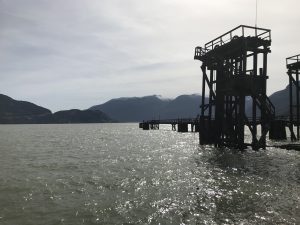LBST 100
Having classes about water and a wide variety of inter and multidisciplinary subjects about water really helped us not only get a better grasp on the water itself but how we would evaluate important information from less important information.
There were so many examples given in class and the way you presented each lecture gave us a better idea of what our project should look and sound like. In our research at first directed our topic to a specific event, but as it became more and more difficult to find articles from multiple other disciplines we had a conversation with our group members to still use the information we gather from our research so far, but to also find something that would connect at a bigger scale, so we went with water rights. This made it easier to find common ground and still use our original specific topic of Kinder Morgan Pipeline. So, by evaluating our goal and refiguring it to make it easier for us as a group to find common ground. As soon as we found a better topic there was more difficulty finding the best possible information for a project that not only had the best possible information but also the most relatable to each other, through meetings and discussions on what was important and what wasn’t.
I was able to make connections with our topic about the Kinder Morgan pipeline because it has been a huge conversation piece amongst my family and friends, there have been so many mixed emotions about it and I took this chance to learn a lot more and gain a better perspective on the subject. Before my research, all I had known was what everyone was, lack of a better term, complaining about. For example, gas prices were significantly higher, but then, on the other hand, people were telling me that in order to save the whales on our coastline that we cant put the pipeline in. All this information helped me in the right direction of where I wanted to go to this subject, and what subject I wanted to pursue further. That being, indigenous studies. I found this subject varying eye-opening because, in my article, it not only talked about the water rights of indigenous peoples but also about their treaty rights and how they literally have laws that protect them from blindside situations like the Kinder Morgan pipeline. One of these laws include the constitution act (35-1), this law is in place to make sure if there are any changes with the government that would affect any indigenous peoples rights at all they are to not only be notified but also engaged and listened too to find a solution for the problem.
I remember in one of our readings, we talked about nature and learning and how indigenous peoples version of knowledge is directly dependent on nature. I thought this was interesting to me because in our research to find common ground with our group, one of the connections between ocean science and indigenous law was nature. Their right to clean water, and understanding what that meant. What a lot of people don’t understand is that just making sure someone has food on the table and making sure that there is water to drink, doesn’t mean you’ve fixed the ongoing problem. The problem is, for indigenous peoples water is their life, they use it in so many ways to be apart of the earth, taking the right of water or effecting its sustainability not only risks the lives of the fish and mammals, but also our bands.
In my future studies, I think the most interesting topics that I will pursue would be indigenous studies and their rights in British Columbia, and also their rights in Canada. This was a very fascinating subject and one that has so much information to gather you could be studying this subject forever. I’ve learned so much from this assignment and I think it will tie in very nicely in my portfolio. I cannot wait to explore this topic even more to have an even better understanding of what rights of indigenous peoples mean and how its the government’s duty to keep up with it.
